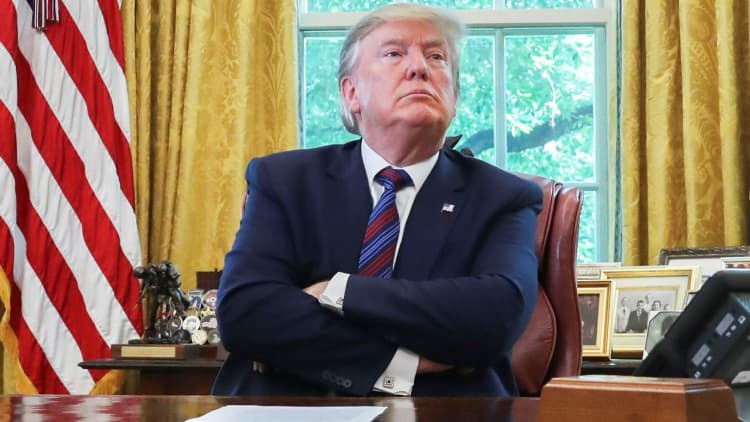
President Donald Trump will hike tariff rates on most imports from China in response to the latest shots in the trade war between the world's two largest economies, he said Friday.
The White House will raise existing duties on $250 billion in Chinese products to 30% from 25% on Oct. 1, the president tweeted. The tariffs on another $300 billion in Chinese goods, which start to take effect on Sept. 1, will now be 15% instead of 10%, he added.
In a series of tweets, the president said he would increase the pressure on Beijing as part of his long-held goal to force China to change what he calls unfair trade practices. Trump has fired more shots in the trade war as he seeks a sweeping trade deal with Beijing — even as the tariffs threaten global economic growth.
"Sadly, past Administrations have allowed China to get so far ahead of Fair and Balanced Trade that it has become a great burden to the American Taxpayer," he tweeted Friday. "As President, I can no longer allow this to happen!"
In a statement Friday announcing the tariffs, the Office of the U.S. Trade Representative called Beijing's planned tariffs on U.S. goods "unjustified." It said it would publish in the Federal Register "as soon as possible any additional details" on the new duties Trump announced.
Trump's tweets about China earlier Friday helped to send major U.S. stock indexes spiraling more than 2% for the day. The trade war intensified in the morning when China announced new tariffs on $75 billion in U.S. goods in retaliation for the U.S. duties on $300 billion in Chinese products.
Trump then tweeted that American companies "are hereby ordered to immediately start looking for an alternative to China, including bringing your companies HOME and making your products in the USA." He did not immediately detail the authority he thought he could use to compel firms to leave China.
U.S. business groups roundly denounced the president's statement, saying it jeopardized their operations. In a statement Friday, the National Retail Federation's senior vice president of government affairs, David French, said, "It's impossible for businesses to plan for the future in this type of environment."
"The administration's approach clearly isn't working, and the answer isn't more taxes on American businesses and consumers. Where does this end?" French said.
Some critics questioned whether it was realistic to cut off relationships with China, which sends more goods to the U.S. than any other country.
Trump's tweet, a detonation in the trade war, sent major U.S. stock indexes tumbling Friday. Even before Trump raised the prospect of U.S. companies leaving China, investors had worried about sagging global economic growth and trade conflicts.
Trump met with his trade policy team at the White House during the day before announcing the tariff increases. At least one trade advisor — China hawk Peter Navarro — has generally supported the trade war escalations.
Sen. Chuck Grassley, an Iowa Republican and chairman of the Senate Finance Committee, said in a statement that Trump is "right to fight back" against China, though the conflict has caused damage to U.S. consumers and Iowa farmers.
"The only way to end this trade war is for China to come to the table and negotiate seriously on an enforceable deal that ends its bad behavior and unfair trade practices. In the meantime, tariffs cannot be the only negotiating tool. Tariffs are not a long-term solution," Grassley said.
Earlier Friday, Federal Reserve Chairman Jerome Powell boosted markets by saying the central bank would take the steps necessary to sustain economic growth. He said the U.S. economy is in good shape despite trade concerns dragging on the global economy.
Trump responded by questioning whether Powell or Chinese President Xi Jinping is the "bigger enemy" of the United States. Trump's implication that Xi is an enemy of the U.S. is potentially a bad omen for trade talks, as the U.S. president previously touted his friendship with the Chinese leader.
As stocks rolled lower during the afternoon, Trump appeared to make a joke about the market drop. A president who spent recent days deflecting any concerns about a slowing economy suggested Democratic Rep. Seth Moulton's exit from the 2020 presidential race hit markets.


